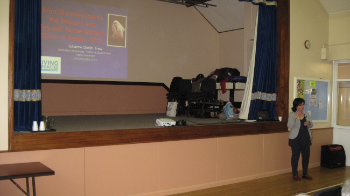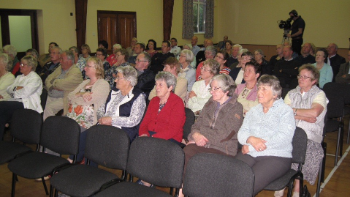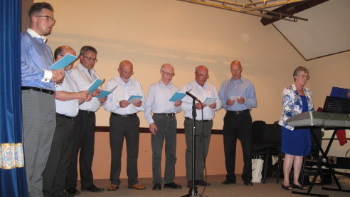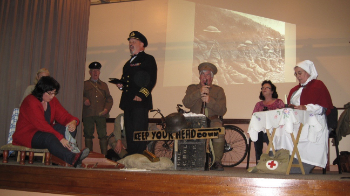Launch of Belfast Somme 100
8th June at 11.00 am at Somme Drive, Castlereagh, Belfast BT6 9JP
Somme Drive, Castlereagh, Belfast BT6 9JP (junction with Thiepval Avenue)

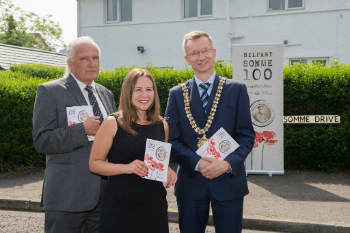
Please click the above for more information or to download Somme 100 PDF click here
PRESS RELEASE
History Hub Ulster
Invites you to a photocall to mark the launch of
Somme 100
Wednesday 8th June at 11am
Somme Drive, Castlereagh, Belfast BT6 9JP (junction with Thiepval Avenue)
In attendance will be
The Right Honourable Lord Mayor, Alderman Brian Kingston
Historian Philip Orr
Karen O'Rawe, Chair of History Hub Ulster
Representatives from the History Hub Ulster Advisory Group
Belfast Somme 100 is a programme of commemorative events marking the centenary of the battles of the Somme, and the place of the Somme campaign within the First World War. The project focuses on the personalities and stories associated with the campaign and mark its place in the social and political history of Northern Ireland and pre-partition Ireland. The Belfast Somme 100 project aims to raise awareness of previously overlooked or submerged stories and personal connections that both the Somme and the events of 1916 have had with the broader history and development of Northern Ireland.
The programme runs for 141 days across Belfast, the exact duration of the Somme campaign in 1916, and features a range of commemorative events including concerts, film, lectures, walks, exhibitions, poetry, debates, theatre, children and family activities.
Flagship events include the Poppy Parade Project on 18th June, the Commemoration Concert with the Irish Guards on 28th June, official commemorations at St Anne’s Cathedral and the Cenotaph, a Conference with the Western Front Association, The Great War at Home with the Ulster Folk and Transport Museum, Artists at the Somme, Castleton Lanterns, and will culminate in November with the Hedge School. Community programmes will be running north, south, east and west of the city and you can check out the ‘In Your Area’ section of belfastsomme100.com for details.
History Hub Ulster is working with a wide range of partners including the Northern Ireland Museums Council, Young at Art, Linen Hall Library, Queen’s Film Theatre, Creative Centenaries, Kabosh, Museum of Orange Heritage, Belfast Book Festival, Feile, Eastside Arts Festival and the Belfast International Festival.
Historian and Belfast Somme 100 Advisory Panel Member, Philip Orr commented:
'The Somme was one of the most costly and brutal campaigns out of many which were fought in the First World War. Thousands of Irishmen fought and died as the battle raged from July to November 1916 but it is for Ulster's Unionists and Loyalists that the Somme holds the most powerful memories. On the opening day, 1st July 1916, the attack of the 36th (Ulster) Division at Thiepval involved massive casualties and a display of great courage. The events of that day soon became a founding story about loyalty and sacrifice for the newly created state of Northern Ireland.'
Chair of History Hub Ulster, Karen O’Rawe, commented:
‘The Somme offensive of 1916 is implanted deeper in the folk-memory than any other First World War battle. The 16th (Irish) and 36th (Ulster) Divisions suffered around 9,000 casualties on the Somme battlefields in 1916, while many more served and died outside these well-known divisions
The impact of this loss of young men reverberated across Belfast and in every village and town across Ireland. This programme of events looks specifically at the impact of the Somme, both in France and in Belfast. The programme will provide alternative routes to education and commemoration, and will reach out to all four corners of the city.’
The Right Honourable Lord Mayor, Alderman Brian Kingston:
“Belfast City Council is delighted to be supporting the Somme 100 programme of events being run by History Hub Ulster. The support for Somme 100 is part of our wider Decade of Centenaries programme this year in which we are marking what is one of the most significant years in the whole Decade. The Council has its own civic programme of activities which is ongoing throughout the year, as well as our “Belfast; Reflections on 1916” exhibition which will be in the East Entrance of City Hall until the end of August. However, the Somme 100 programme offers the opportunity for us in Council to be able to support programmes, events and activities within local neighbourhoods and I pay tribute to History Hub Ulster and their Advisory group for the fantastic and engaging programme that they have put together”
The objectives of the Somme 100 project are to dispel myths and stereotypes, to promote and encourage dialogue within communities and with other communities and to create a space which allows the development of mutual understanding.
Keep a regular check on our website at belfastsomme100.com, Facebook page, and follow us on twitter @belfastsomme100.
The project is run by History Hub Ulster with an Advisory Panel made up of experts in the period and community leaders. It is funded by Belfast City Council.
About History Hub Ulster
History Hub Ulster is a community based organisation. We aim to promote and produce projects and partnerships which are engaging to all members of the community and to instil a sense of pride in our ancestors’ achievements; To put family and communities at the centre of the historical narrative; To engage the communities of Ulster with their history by pursuing interesting and innovative projects which enhance the individual’s understanding of their shared heritage.
Top of Page
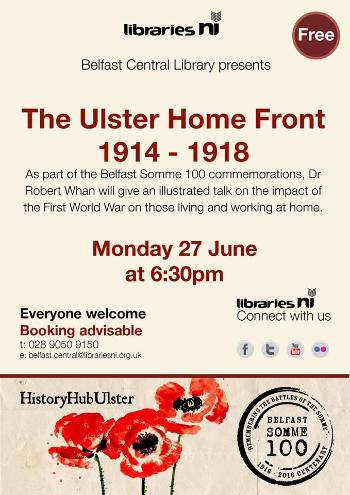 On Monday 27 June 2016 Dr Robert Whan, Living Legacies’ History Engagement Officer, gave a talk in Belfast City Library on the First World War home front in Ulster. This was part of the Belfast Somme 100 programme.
On Monday 27 June 2016 Dr Robert Whan, Living Legacies’ History Engagement Officer, gave a talk in Belfast City Library on the First World War home front in Ulster. This was part of the Belfast Somme 100 programme.
